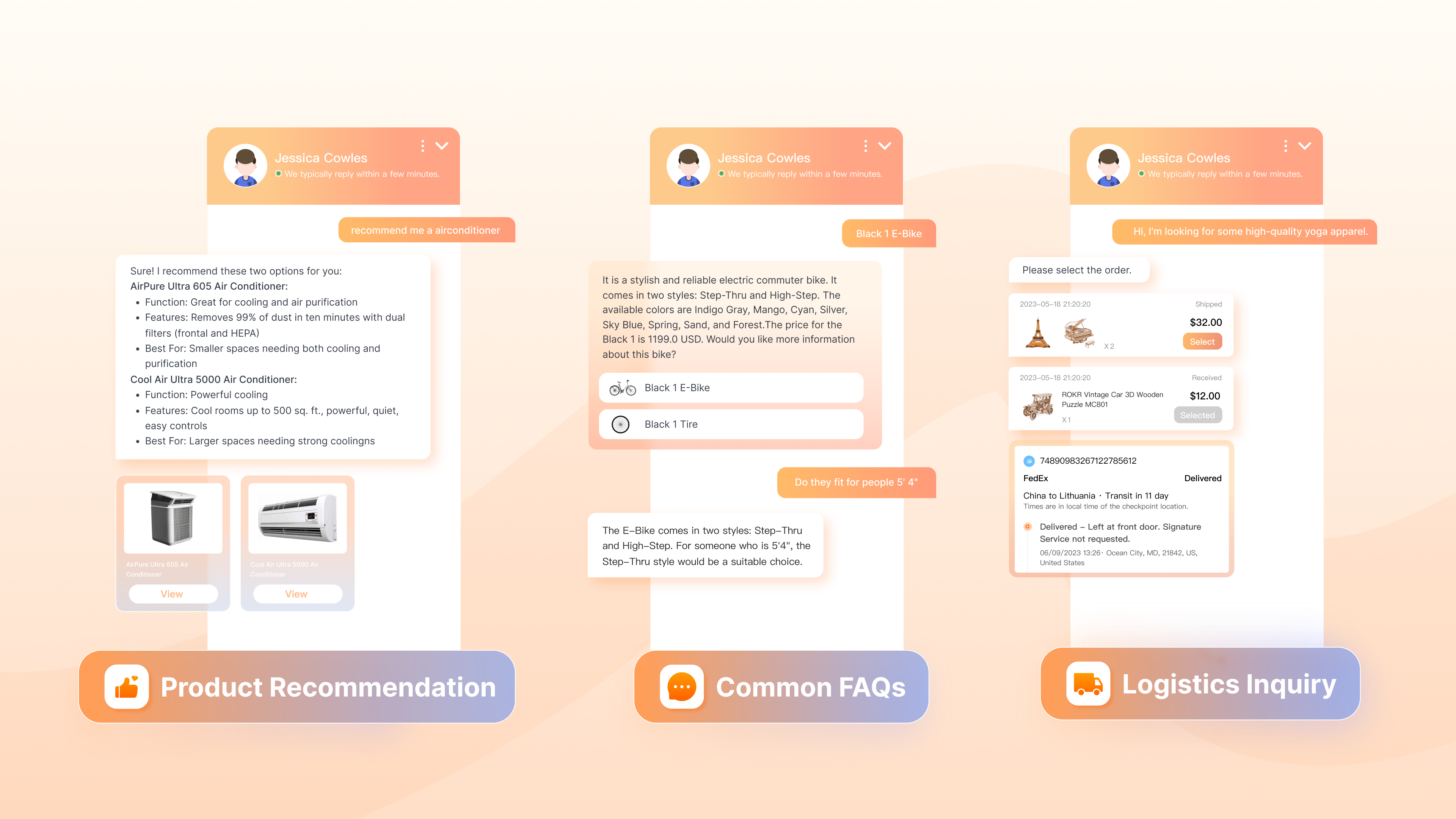Top 10 Ecommerce Customer Service Software for 2024

Exceptional customer service remains crucial in ecommerce. A staggering 96% of consumers say that customer service is vital for brand loyalty. The ecommerce landscape continues to evolve rapidly, necessitating updated software solutions to meet rising expectations. In 2024, businesses must adopt advanced tools to stay competitive. This blog reviews the top 10 ecommerce customer service software, highlighting the essential ecommerce customer service software features to look for, guiding you to make informed decisions.
Importance of Customer Service in Ecommerce

Enhancing Customer Experience
Building Customer Loyalty
Exceptional customer service builds customer loyalty. Customers appreciate prompt and helpful responses. Positive interactions encourage repeat business. Businesses that prioritize customer service see higher retention rates. Loyal customers often become brand advocates, promoting the business to others.
Increasing Customer Satisfaction
Customer satisfaction increases with effective service. Quick resolutions to issues make customers happy. Happy customers leave positive reviews. Positive reviews attract new customers. Satisfied customers are more likely to return for future purchases.
Impact on Sales and Revenue
Reducing Cart Abandonment
Effective customer service reduces cart abandonment. Customers often abandon carts due to unanswered questions. Providing real-time support addresses these concerns. This leads to higher conversion rates. Increased conversions boost overall sales.
Encouraging Repeat Purchases
Good customer service encourages repeat purchases. Customers value businesses that provide excellent support. Repeat customers contribute significantly to revenue. Businesses with high customer retention see steady growth. Consistent service quality fosters long-term relationships.
Competitive Advantage
Differentiating from Competitors
Outstanding customer service differentiates businesses from competitors. Many companies offer similar products. Exceptional service sets a business apart. Customers choose businesses that provide superior support. This creates a competitive edge in the market.
Improving Brand Reputation
Good customer service improves brand reputation. Positive experiences lead to favorable word-of-mouth. A strong reputation attracts new customers. Businesses known for great service build trust. Trust enhances customer loyalty and drives sales.
"Customers are willing to pay more for good customer service. Negative experiences can lead to loss of customers."
Investing in customer service is crucial for ecommerce success. Good service leads to higher satisfaction, loyalty, and revenue. Poor service can deter customers and cause financial losses. Prioritizing customer service provides a significant competitive advantage.
Ecommerce customer service software features to look for
Multi-Channel Support
Email Support
Email support remains a cornerstone of customer service. Businesses must ensure that their software can handle high volumes of emails efficiently. Automated responses can acknowledge receipt of inquiries, setting customer expectations. Integration with other systems allows for seamless ticket creation and tracking. This ensures that no customer query goes unanswered.
Live Chat
Live chat offers real-time support, which is crucial for resolving issues quickly. Customers appreciate the immediacy of live chat. It reduces wait times and provides instant solutions. Live chat also allows agents to handle multiple conversations simultaneously. This increases efficiency and customer satisfaction.
Social Media Integration
Social media integration is essential in today’s digital age. Customers often reach out via platforms like Facebook, Twitter, and Instagram. Integrating these channels into your customer service software ensures that all inquiries are managed from a single interface. This streamlines communication and ensures consistent responses across all platforms.
Automation and AI
Chatbots
Chatbots offer 24/7 support, handling common queries without human intervention. They provide quick answers to frequently asked questions. This frees up human agents to tackle more complex issues. Chatbots can also guide customers through basic troubleshooting steps. This improves resolution times and enhances the overall customer experience.
Automated Responses
Automated responses ensure that customers receive immediate acknowledgment of their inquiries. This sets clear expectations about response times. Automation can also route tickets to the appropriate department. This reduces the time spent on administrative tasks. Automated responses improve efficiency and customer satisfaction.
Analytics and Reporting
Customer Insights
Customer insights provide valuable data about customer behavior and preferences. Analytics tools can track metrics such as response times, resolution rates, and customer satisfaction scores. This data helps businesses identify areas for improvement. Customer insights enable personalized support, enhancing the customer experience.
Performance Metrics
Performance metrics allow businesses to measure the effectiveness of their customer service efforts. Key metrics include average response time, ticket resolution time, and customer satisfaction ratings. Monitoring these metrics helps businesses optimize their processes. Performance metrics drive continuous improvement and ensure high-quality service.
Top 10 Ecommerce Customer Service Software for 2024

Software 1: Zendesk
Overview
Zendesk offers a robust and scalable customer service solution. Businesses of all sizes can benefit from its comprehensive features.
Key Features
Multi-channel support
AI-powered chatbots
Advanced analytics and reporting
Customizable ticketing system
Pros and Cons
Pros:
Highly scalable
Extensive integration options
User-friendly interface
Cons:
Higher cost for advanced features
Steep learning curve for new users
Software 2: Freshdesk
Overview
Freshdesk provides an intuitive and easy-to-use platform for managing customer interactions. The software is suitable for small to medium-sized businesses.
Key Features
Omnichannel support
AI-driven automation
Self-service portal
Collaboration tools
Pros and Cons
Pros:
Affordable pricing
Easy setup and implementation
Strong automation capabilities
Cons:
Limited customization options
Basic reporting features
Software 3: Ada AI Agent
Overview
Ada AI Agent excels in providing autonomous customer service. The software leverages advanced AI to resolve over 70% of inquiries without human intervention.
Key Features
AI-powered automation
Seamless integration with ecommerce platforms
Omnichannel support
Powerful analytics and reporting tools
Pros and Cons
Pros:
High level of automation
Reduces workload for human agents
Enhances customer experience
Cons:
Requires initial setup and training
Higher upfront cost
Software 4: Zoho Desk
Overview
Zoho Desk offers an all-in-one customer service automation solution. The software caters to new-age tech companies with futuristic visions.
Key Features
Multi-channel support
AI and automation tools
Customizable dashboards
Integration with other Zoho products
Pros and Cons
Pros:
Comprehensive feature set
Affordable pricing
Strong integration capabilities
Cons:
Limited third-party integrations
Occasional performance issues
Software 5: QuickCEP
Overview
QuickCEP specializes in providing efficient customer service solutions for ecommerce businesses. The software focuses on enhancing customer engagement and satisfaction.
Key Features
Real-time chat support
Automated ticketing system
Customer feedback tools
Integration with popular ecommerce platforms
Pros and Cons
Pros:
User-friendly interface
Strong focus on customer engagement
Affordable pricing
Cons:
Limited advanced features

Software 6: Help Scout
Overview
Help Scout provides a simple and effective customer service platform. The software is ideal for small to medium-sized businesses.
Key Features
Email and live chat support
Knowledge base
Customer management tools
Reporting and analytics
Pros and Cons
Pros:
Easy to use
Affordable pricing
Strong customer management features
Cons:
Limited customization options
Basic automation tools
Software 7: Gorgias
Overview
Gorgias focuses on providing a seamless customer service experience for ecommerce businesses. The software integrates well with major ecommerce platforms.
Key Features
Multi-channel support
Automation and macros
Customer data integration
Performance analytics
Pros and Cons
Pros:
Strong ecommerce integration
Efficient automation tools
User-friendly interface
Cons:
Higher pricing for advanced features
Limited reporting capabilities
Software 8: LiveAgent
Overview
LiveAgent offers a comprehensive help desk solution. The software provides multi-channel support and robust automation features.
Key Features
Live chat and email support
Ticketing system
Automation rules
Reporting and analytics
Pros and Cons
Pros:
Affordable pricing
Strong automation capabilities
Easy to set up
Cons:
Limited customization options
Basic reporting tools
Software 9: Tidio
Overview
Tidio provides a versatile customer service platform. The software offers live chat, chatbots, and email integration.
Key Features
Live chat and chatbots
Email integration
Visitor tracking
Analytics and reporting
Pros and Cons
Pros:
Easy to use
Affordable pricing
Strong chatbot capabilities
Cons:
Limited advanced features
Basic reporting tools
Software 10: eDesk
Overview
eDesk serves as a leading ecommerce helpdesk solution. The software caters to thousands of major retailers worldwide.
Key Features
Multi-channel support
Automation tools
Customer feedback integration
Advanced reporting
Pros and Cons
Pros:
Strong focus on ecommerce
Comprehensive feature set
Scalable solution
Cons:
Higher pricing for advanced features
Steep learning curve for new users
Software 4
Overview
Zoho Desk offers an all-in-one customer service automation software. The platform supports new-age tech companies with futuristic visions.
Key Features
Multi-channel support
AI and automation tools
Customizable dashboards
Integration with other Zoho products
Pros and Cons
Pros:
Comprehensive feature set
Affordable pricing
Strong integration capabilities
Cons:
Limited third-party integrations
Occasional performance issues
Software 5: QuickCEP
Overview
QuickCEP specializes in providing efficient customer service solutions for ecommerce businesses. The software focuses on enhancing customer engagement and satisfaction.
Key Features
Real-time chat support
Automated ticketing system
Customer feedback tools
Integration with popular ecommerce platforms
Pros and Cons
Pros:
User-friendly interface
Strong focus on customer engagement
Affordable pricing
Cons:
Limited advanced features
Basic reporting tools
Software 6: Help Scout
Overview
Help Scout provides a simple and effective customer service platform. The software is ideal for small to medium-sized businesses.
Key Features
Email and live chat support
Knowledge base
Customer management tools
Reporting and analytics
Pros and Cons
Pros:
Easy to use
Affordable pricing
Strong customer management features
Cons:
Limited customization options
Basic automation tools
Software 7
Overview
Gorgias provides a seamless customer service experience tailored for ecommerce businesses. The platform integrates effortlessly with major ecommerce systems, ensuring smooth operations.
Key Features
Multi-channel support
Automation and macros
Customer data integration
Performance analytics
Pros and Cons
Pros:
Strong ecommerce integration
Efficient automation tools
User-friendly interface
Cons:
Higher pricing for advanced features
Limited reporting capabilities
Software 8: LiveAgent
Overview
LiveAgent offers a comprehensive help desk solution suitable for businesses of all sizes. The software provides multi-channel support and robust automation features.
Key Features
Live chat and email support
Ticketing system
Automation rules
Reporting and analytics
Pros and Cons
Pros:
Affordable pricing
Strong automation capabilities
Easy to set up
Cons:
Limited customization options
Basic reporting tools
Software 9: Tidio
Overview
Tidio provides a versatile customer service platform designed for ecommerce. The software offers live chat, chatbots, and email integration, making it a comprehensive solution.
Key Features
Live chat and chatbots
Email integration
Visitor tracking
Analytics and reporting
Pros and Cons
Pros:
Easy to use
Affordable pricing
Strong chatbot capabilities
Cons:
Limited advanced features
Basic reporting tools
Software 10
Overview
eDesk serves as a leading ecommerce helpdesk solution. Thousands of major retailers worldwide rely on this software. The platform focuses on providing efficient and scalable customer service.
Key Features
Multi-channel support
Automation tools
Customer feedback integration
Advanced reporting
Pros and Cons
Pros:
Strong focus on ecommerce
Comprehensive feature set
Scalable solution
Cons:
Higher pricing for advanced features
Steep learning curve for new users
Choosing the right customer service software is crucial for ecommerce success. Key features to consider include multi-channel support, AI-driven automation, and robust analytics. Businesses should evaluate their specific needs and budget before making a decision. Future advancements in customer service technology promise even greater efficiency and customer satisfaction. For further reading, explore FAQs or additional resources.
See Also
Best 10 Questions to Ask in E-commerce Customer Service Interviews
2024 Guide: Resolving Typical Challenges for Better Customer Satisfaction in E-commerce
Top 12 Videos to Boost Your E-commerce Sales


